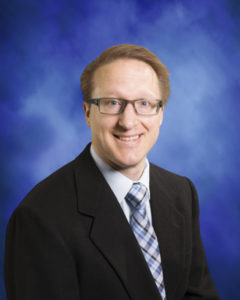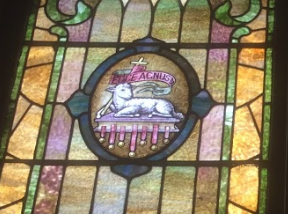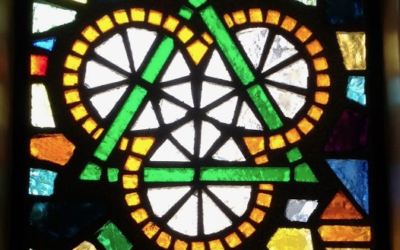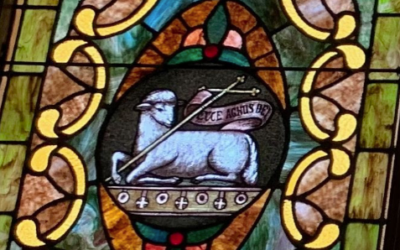Holy Trinity – The Triune God has accomplished our salvation
Sunday, May 30, 2021
Watch the service
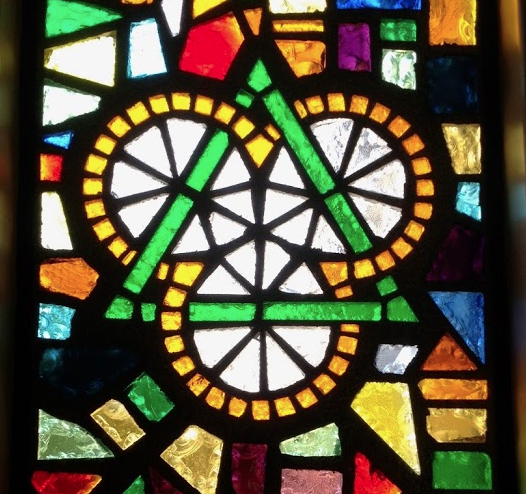
Do You Want To See Heaven?
Be careful of what you wish for. Many years ago, when I was a child, the circus came to town. Actually, it wasn’t the circus. It was a troupe of clowns. And they didn’t come to town. They came to our school. We were all excited at the idea of having clowns come to our school. The reality was not as exciting. They came. They told jokes. They did tricks. But then they started interacting with us children. And that’s when a fun event turned into a fearful one. Imagine small children being accosted by intrusive clowns. Imagine it being a hot, summer day, where the plastic makeup on their faces runs, and the plastic clothing makes them sweat. Scary. Be careful what you wish for. Today we run into the same sort of scenario. Isaiah gets what he always wanted. He wanted to see God. But it’s not what he imagined it to be. In Isaiah 6, we read: “1 In the year that King Uzziah died, I saw the Lord, high and exalted, seated on a throne; and the train of his robe filled the temple. 2 Above him were seraphim, each with six wings: With two wings they covered their faces, with two they covered their feet, and with two they were flying. 3 And they were calling to one another: “Holy, holy, holy is the Lord Almighty; the whole earth is full of his glory.”” (Is. 6:1–3 NIV11-GKE)
Isaiah gets to see our Triune God in all his glory. He sees our God’s great might, power, and position. He sees these high-ranking angels, called, “seraphim” calling out to each other again and again these triplets, “holy, holy, holy.” This is why we read this part of the bible on this Sunday. For we conclude that when they say “holy” three times, they are reflecting the fact that we have an worship the Triune God.
What an amazing sight. And who hasn’t been in Isaiah’s shoes. There are those times in our lives when, more than anything, we want to see heaven. Sometimes it’s because we have really bad days. The weight of our own failures and the frustrations of this life pile up. And we yearn to simply be done with this world and with this life. Other times it’s when we have really good days. On Easter Sunday, when we have sung those amazing Easter hymns lifting our eyes to our resurrected Savior. Or it can be at a funeral where we might be a little envious that our dad or grandma is now in heaven and we aren’t yet. We want to see heaven. But what happens next in these words? “4 At the sound of their voices the doorposts and thresholds shook and the temple was filled with smoke. 5 “Woe to me!” I cried. “I am ruined! For I am a man of unclean lips, and I live among a people of unclean lips, and my eyes have seen the King, the Lord Almighty.”” (Is. 6:4–5 NIV11-GKE)
Isaiah sees the Lord of heavenly armies.1 And he is amazed. But then it dawns on him what is happening. He sees our Triune God in all his might, power, and glory, and he is then reminded of his sin. He is reminded that he doesn’t belong there in heaven. And he doesn’t deserve to even see it from afar. Notice that Isaiah shows how important his own sin is. His sin is not a small matter that he could ignore. His sins separated him from his Lord. Notice too how he shows how infectious his sins were. If ever there were a time to speak about this it would be now. For how many months we wore masks because our breath could get our there into someone else and make them sick. The same is true with our words. We infect others with unclean words. And other people infect us with unclean words.
And my dear friends, do we always look at sin the way that Isaiah does? Or have we concluded to ourselves that sin really isn’t that important? Each of us has a sinful nature. And our sinful nature likes to teach us that the other person’s sins are important and worthy of being condemned. But our own sins should be overlooked. We have these temptations to lie, lust, be lazy; to not trust, not be kind, not hold our Triune God in the highest place in our lives. And far more than we would admit, we give into them.
And these sins aren’t just important. They are infectious. As parents we can get angry that our kids learn bad words in school on the recess field. But, it’s just as likely, if not even more so, that they learn impure words from us parents. Our sins are not just important. They are also infectious. What then will happen next? We read: “6 Then one of the seraphim flew to me with a live coal in his hand, which he had taken with tongs from the altar. 7 With it he touched my mouth and said, “See, this has touched your lips; your guilt is taken away and your sin atoned for.”” (Is. 6:6–7 NIV11-GKE)
The Triune God reacts to Isaiah’s comments. And, my dear friends, notice what the Lord does not do. He does not say that Isaiah’s words are nonsense and that his sin is ‘no big deal.’ Our Triune God treats Isaiah’s sin with the importance and infectiousness that it has. And notice what he does. Isaiah says that his lips are impure. So the Lord creates a sacrament. Remember what a sacrament is. A sacrament is when God joins the power of his word with an earthly element. He has the angel take a burning coal from the fire. And then the coal is placed on Isaiah’s lips. His sin is taken away. His impurity is paid for. Now, my dear friends, it’s not the burning goal that did that work. Instead, it was the promise of the Triune God that was attached to it that got that work done. The promise that was valid for Isaiah was valid because there was a Savior who came into the world as a human long after that who would take on human flesh and blood. He would breathe and then die for Isaiah to pay for his sins and make him clean and pure so that he could stand before his Triune God.
And the same is true for us. Our sins are real. They are both important and infectious. and we need to start there. But, my dear friends in Christ, since our sins are real and big, we have a real and big Savior to deal with them. And just as surely as our Triune God connected a burning coal to the promise of his word for Isaiah, so also has he connected the same promise of forgiveness to water in your baptism. But notice how these words end: “Then I heard the voice of the Lord saying, “Whom shall I send? And who will go for us?” And I said, “Here am I. Send me!”” (Is. 6:8 NIV11-GKE)
Just as the sin that Isaiah committed was serious and important, so also was the forgiveness. But the forgiveness wasn’t just important. It was also infectious. Sin isn’t the only thing that is infectious. So is forgiveness. It moved, it drove, it invited Isaiah to live for today because he had heaven waiting for him later.
The same is true for us. There will be a day when we will see heaven—face to face. And we can say what is in our hearts to say for our lips will be pure. But that fact isn’t just meaningful on that day. It is meaningful to us right now. We can live for our Triune God right now, serving him. So let us look forward to seeing heaven. But let us also see how we are forgiven. Amen.
1 ”יְהוָ֥ה צְבָא֖וֹת“ (Is. 6:5 BHS-T)
